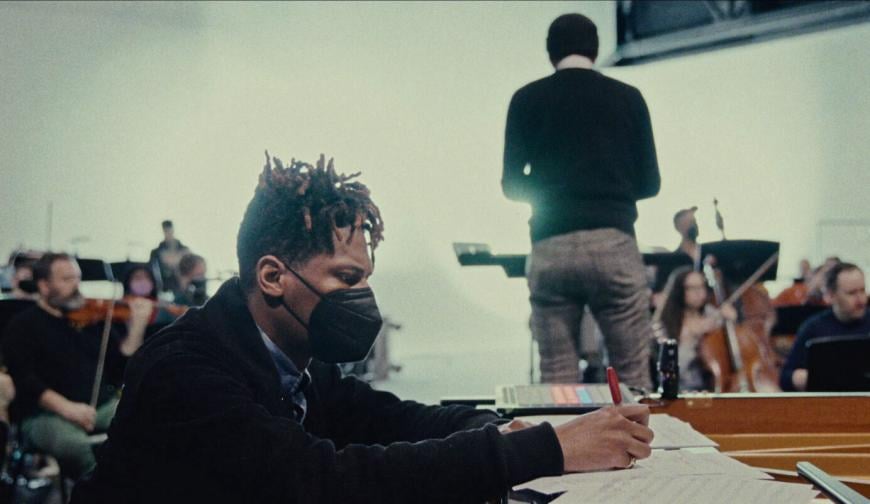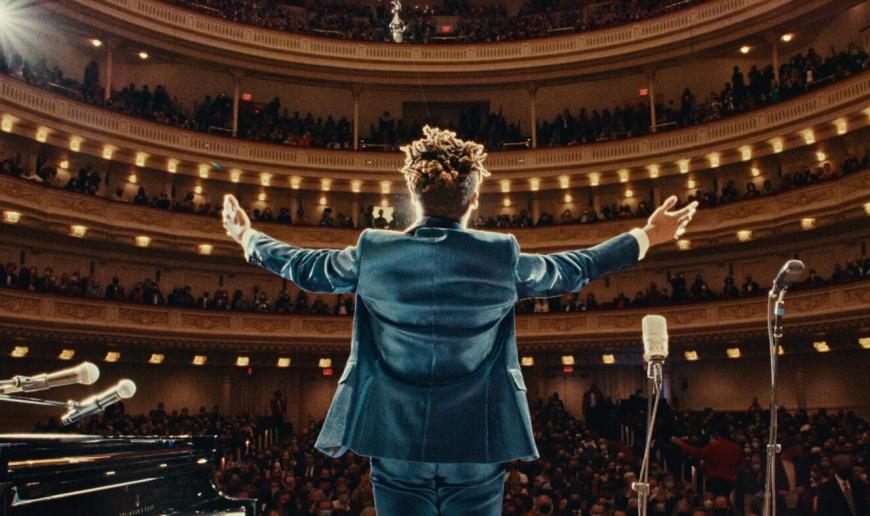
In 2022, multi-hyphenate musician and bandleader Jon Batiste received 11 Grammy nominations and was hard at work on his American Symphony, which would premiere at Carnegie Hall in September. At the same time, after a decade in remission, his wife, writer Suleika Jaouad, once again had leukemia. All of this is chronicled in the 2023 Netflix documentary American Symphony, which has just been nominated for an Academy Award in the category of Best Original Song for “It Never Went Away,” with music and lyrics by Batiste and Dan Wilson.
Batiste says in the film, “What we love about music is not that it sounds good, but what we love about music is that it sounds inevitable. It’s playing the thing that we all know is unfolding, whether we want to accept it or not.”
Released for streaming on Nov. 29, 2023, the film had its world premiere at the Telluride Film Festival on Aug. 31, 2023. Academy Award-nominated filmmaker Matthew Heineman’s original conceit was to follow the music and Batiste as he composed American Symphony. Then life happened and rewrote the script.

For the documentary, 1,500 hours has been whittled down to a total watch time of an hour and 43 minutes. For seven days a week during a span of seven months, Batiste and Jaouad allowed cameras into the intimate moments of their lives. While viewers see Batiste work on different parts of the composition and in rehearsal — figuring out what must go, what is still needed — the film editing yields a tightly woven narrative.
There’s Batiste performing onstage, literally aglow with a wide smile and sequins sparkling under the stage lights. There’s Batiste at Jaouad’s bedside as she receives her bone marrow transplant. There’s Batiste splayed out on his comforter, head under his pillow in grief and on the phone with his therapist. Then back to the music. To write an “American” symphony is to ask what can paint a complete picture of America.
Batiste isn’t easily categorized musically. In the film, he speaks with a friend about an article saying he shouldn’t have been nominated for a Grammy in classical music because he’s a pop musician. His friend says, “You’re a musician’s musician,” to which Batiste replies, “That should be celebrated, that we decided to put a classical composition on the album that’s not a classical album.” As if in a call-and-response, his friend says, “Which is even scarier for them because that means classical is not this, like, conventional pigeonhole situation.”

The composition American Symphony pushes against conventional ideas about the classical canon. The Carnegie Hall notes for the piece describes it as a large-scale work “that bears witness to America’s history and future living side by side in music.” The piece also pays homage to musical greats who have performed at Carnegie Hall, including Nina Simone, Duke Ellington, and Mahalia Jackson.
In the film, Batiste, lingering at the piano in his teacher’s studio, describes American Symphony as being written for jazz, classical, and all kinds of musicians.
In an interview with movie site HeyUGuys, Heineman says that part of Batiste’s genius is not just his mastery of his craft but that insatiable desire and openness to keep learning. Writing an American symphony takes grit and a bit of chutzpah in winnowing what fits and knowing that, inevitably, there is so much more one could add to the score.
Batiste’s musical collaborators have varied, from Wynton Marsalis to Lenny Kravitz, Stevie Wonder, Mavis Staples, and Prince. His long-standing role as bandleader and musical director of The Late Show With Stephen Colbert from 2015 to 2022 brought him and his band Stay Human before a wide audience.
The New Orleans-born Batiste comes from a family of Louisiana musicians. In the documentary, he revisits his alma mater, Juilliard, and notes how much the school has changed since he was there — remembering the lukewarm reception to one of his instruments, the melodica, when he was a student and pointing out that now there is a mural of him at the school that includes the instrument.
The documentary includes the 2022 Grammys ceremony at which Batiste performed and won five awards, including Album of the Year for We Are. If Batiste wins this year’s Academy Award for Best Original Song, it will not be his first Oscar — in 2021, he won Best Original Score, along with Trent Reznor and Atticus Ross, for the Pixar film Soul.
The Carnegie Hall performance at the heart of the documentary feels like a family reunion and has the kinetic anticipation of a much-desired celebration. Jaouad leans over in her seat and, through her burgundy KN95 mask, tells someone that it’s her first time out in almost a year. And then the power in the hall goes out. It’s like the whole topsy-turvy year was leading to this surprise moment. How will the show go on? Out of the silence — the musicians onstage stilled — come the faint and then growing notes of Batiste on piano. It’s the closest thing to a musical version of speaking in tongues, though the audience needs no translation.
Jaouad and Batiste have partnered with her hospital, Memorial Sloan Kettering Cancer Center, on a campaign to get more young people to donate bone marrow and “join the symphony”
Batiste’s two performances at The Fillmore in San Francisco on Feb. 18 as part of the Uneasy Tour are sold out, but there is a waitlist. Batiste is again in California on April 13 and 20 to play Coachella.




